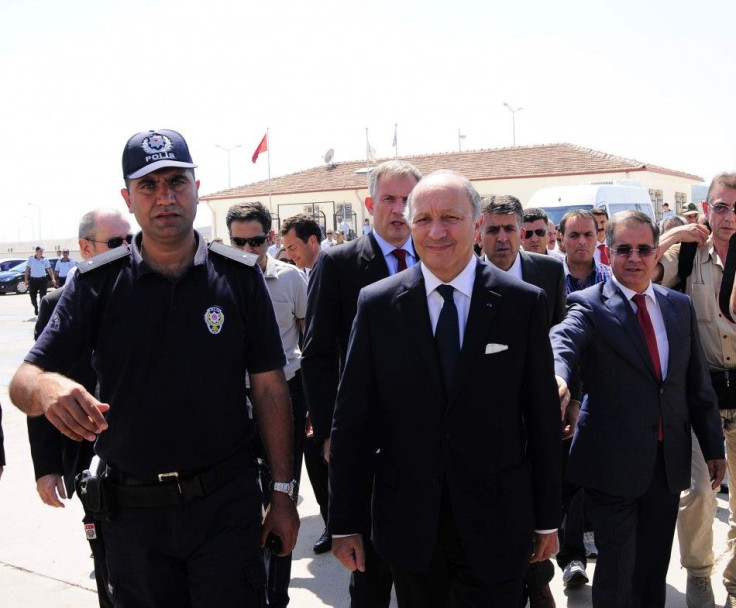Turkey, Long A Proponent Of 'Zero Problems With Neighbors', Now Has A Very Big One

ISTANBUL -- "Zero problems with neighbors" used to be the motto at the very heart of Turkey's foreign policy. It was a reflection of the "peace at home, peace in the world" policy established by Mustafa Kemal Ataturk, founder of the Turkish Republic.
But that was before Turkey's next-door neighbor, Syrian president Bashar al-Assad, waged a fierce war against his own people, turning the 18-month old insurgency against him into a bloody conflict.
And today, Turkey's Foreign Minister Ahmet Davutoglu warns of a dangerous international problem, one that stems from a mass influx of refugees seeking asylum from the bloodshed in Syria.
Ankara said it is now housing as many as 100,000 refugees and does not want any more, but as the conflict worsens, thousands of people - including children unaccompanied by their parents - are turning up at the border. The United Nations High Commissioner for Refugees anticipates that the number could soon reach 200,000.
To ease the load, Turkey has urged the UN to create a safe haven within Syria. "We will emphasize that this burden now needs to be shared by the whole international community, not just by Syria's neighbors," Davutoglu said Monday. Jordan and Lebanon have also seen a surge in refugees in the past two weeks.
Meanwhile, Turkey has opened four new refugee camps, signaling that it will accept more refugees.
"There is a long way to the go until Turkey reaches its limit. In a practical sense they have a large capacity and lots of room, as well as resources and support from the international community," said David Pollock, a Senior Fellow at the Washington Institute for Near East Policy. "The issue is more whether this creates an unmanageable and uncomfortable social strain in Turkey."
That may be exactly what is happening, according to Pollock, who was in the Turkish border town of Antakya in July. Locals have complained of unruly behavior by some of the refugees, who according to some reports eat at restaurants without paying, make unwanted advances on women, and generally make a nuisance of themselves.
The recent surge also poses a security risk: the government fears that radical Islamic militants are entering Turkey under the guise of refugees. That is a reason Ankara is expected to impose restrictions on the refugee flow, and that, despite having the capacity to house more refugees, it may say it doesn't. "It won't be too much longer before the Turks say they have reached their limit and threaten to close the border," said Pollock, who anticipates that this will be a signal from Turkey to the international community to act with more urgency.
But that urgency is, for now, conspicuoulsy absent.
Deadlock Continues at the UN
"We expect the United Nations to engage on the topic of protecting refugees inside Syria and if possible sheltering them in camps there," Davutoglu said on Monday. But Thursday's UN Security Council meeting achieved nothing new.
If a buffer zone were to be implemented, it would require a UN resolution for a no-fly zone - a measure that is unlikely to be approved while Russia and China consider it a violation of Syria's sovereignty.
Also speaking at the meeting, Britain's Foreign Minister William Hague said no option would be ruled out, but stressed that military intervention would be required for a 'buffer zone.' That intervention is not something the UN Security Council has considered.
In a rare television appearance on Wednesday, Assad also spoke on the idea of a buffer zone. "I believe that talk about a buffer zone is not practical, even for those countries which are playing a hostile role (against Syria)," he said speaking on Addounia TV.
The 15 UN Security ouncil members reached no resolution on Thursday. "How long are we going to sit and watch while an entire generation is being wiped out by random bombardment and deliberate mass targeting?" Davutoglu asked at the end of the meeting.
Turkey's frustration has been fueled further after NATO's response to the buffer zone idea was also lukewarm. The military alliance's largest members, led by the U.S., are markedly hesitant when the subject of a Syrian no-fly zone comes up. And in any case, action from the alliance would still require a resolution on the use of force from the UN Security Council.
With no concrete support from the international community, Turkey is left with few alternatives. Safe havens are ill-defined ideas and based on wishful thinking, as opposed to clearly thought-out strategy, according to Pollock. For the Syrians already in Turkey, there is talk of dispersing them into different areas, but local governments have no detailed plans.
At stake for Turkey is also its newfound role as a serious regional power and mediator, which in recent years it has gained through economic expansion and growing ties with regional states in addition to military might. Still mindful of the crisis brought by Iraqi refugees after the first Gulf War in 1991, Turkey does not want to repeat the experience.
In the coming weeks, international attention will be on Ankara, monitoring how it copes with the welfare and security issues both at the border and in the camps. But Turkey will continue to appeal for safe zones in Syria, a Turkish diplomat told Agence France Presse on Thursday. "This is not a problem Turkey can handle on its own," he said.
© Copyright IBTimes 2024. All rights reserved.











